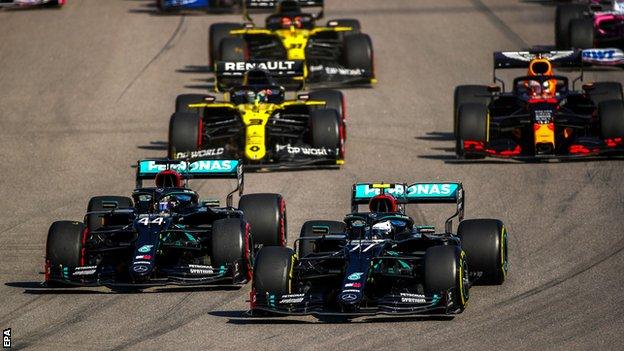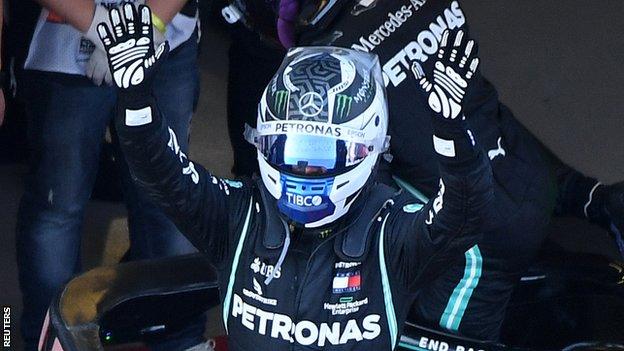

In the end, the record will have to wait. An uncharacteristically error-strewn weekend from Lewis Hamilton at the Russian Grand Prix meant Michael Schumacher still stands alone in Formula 1’s history books – for one more race at least.
Things had started to unravel for Hamilton in a chaotic qualifying session on Saturday, in which the Mercedes driver took his 96th career pole, but came within a second of qualifying 15th as a result of a series of errors.
Hamilton asked his team if he could do his practice starts from further up the pit lane than the usual spot, and they said he could.
The stewards disagreed, and Hamilton was given a 10-second penalty. Initially, they also gave him two penalty points that moved him within two of an automatic one-race ban. But that decision was later rescinded, giving him a bit more breathing space over the next four races, although he will still have to be careful.
Hamilton thought his punishment for what he regarded as a relatively harmless error was “ridiculous” and provocatively added: “It is to be expected. They’re trying to stop me, aren’t they?”
He rowed back on that a few minutes later, saying: “I don’t necessarily think it’s for me. Whenever a team is at the front, they are under a lot of scrutiny. Everything we have on our car is being triple checked and triple checked. They are changing rules, such as the engine regs. Lots of things to keep the racing exciting, I assume.
“I don’t know if the rules in terms of what happened today was anything to do with it, but naturally that’s how it feels. It feels we’re fighting uphill.
“But that’s OK. It’s not like I haven’t faced adversity before.”
The rules Hamilton was determined to have broken were in two separate places – the race director’s event notes and the sporting regulations.
The event notes say that “practice starts may only be carried out on the right-hand side after the pit exit lights” and that “cars may not stop in the fast lane at any time the pit exit is open without a justifiable reason (a practice start is not considered a justifiable reason)”.
The sporting regulations add that in the pre-race period drivers must “use constant throttle and constant speed in the pit exit”.
As he approached the spot where drivers do their practice starts, Hamilton told engineer Peter Bonnington over the radio that there was a lot of rubber down there.
He had been told to try to find a spot a little further forward, with minimal rubber, to better reflect conditions on the grid, so the car’s electronics could be tuned more accurately.
So he asked if he could find somewhere else with less rubber and was told he could. The pit lane in Sochi is particularly long, and Hamilton drove right to the end of it, just before it joins the track, before stopping to do his practice start.
This was not quite what the engineers had intended. Chief engineer Andrew Shovlin said: “Lewis asked if he could go a bit further. We hadn’t realised quite how far he was he was going to go.”
They did not see the first start, Shovlin said, adding: “When we saw the second one, we thought: ‘They’re not going to like that.'”
But team boss Toto Wolff said he felt that it was not in breach of the event notes, not only because it still complied with the letter, in that it was after the lights and on the right-hand side, but also because “there is no mention of what the right place is”. That is, there is a conventional place drivers do their practice starts, but no specific start box marked out.
Wolff and sporting director Ron Meadows argued Hamilton’s case, but their arguments were dismissed.
“I am not happy with the penalty because it’s far-fetched,” Wolff said. “I will always respect the stewards in their job but on that one we agree to disagree.”
What particularly annoyed Mercedes was that Hamilton was given an in-race penalty for an offence that happened before the race. This, they felt, was contrary to precedent.
“There are rules that can be interpreted in two ways,” Wolff said. “There is common sense. There is the fact that two in-race penalties were given for an infringement that happened before the race.
“There was an argument he gained an advantage by doing the starts there. There was not an advantage because there was no grip, so much less than he would have on the starting positions.
“But it is what it is. We are all emotional about that but the emotion should be geared towards Valtteri, who deserved a race win for a long time and that makes me happy.
“Finishing one and three is reason to make us cheer and fly home and say we can be satisfied with how it went. We need to learn from the incident, look at the procedures and communications. And, as every time, we will not blame the person but target the problem.”

Hamilton, though, will not be satisfied with how the weekend went. Not at all.
He took a brilliant pole position more than 0.6 seconds faster than Bottas, but only after narrowly escaping what would have been an embarrassing foul-up.
He had not set a time in second qualifying when the red flags came out following a crash by Sebastian Vettel’s Ferrari. There were two minutes and 15 seconds left when the season was re-started, and Hamilton crossed the line to start the lap that got him into the top 10 shoot-out with only a second to spare before the chequered flag ended the session.
Had he got that wrong, he would have been starting the race 15th.
The qualifying mix-ups left Hamilton starting the race on the soft tyre, when he had wanted to be on the medium – as were Verstappen and Bottas behind him.
Hamilton made a big deal out of that after qualifying and before the race, saying how much harder it was going to make it to win the race.
Had he lost out to Bottas at the start, it would have done – because the Finn would have been in front and on a better tyre. As it was, without the penalty, Hamilton probably would have won.
Bottas did come close to overtaking Hamilton at the first corner, taking advantage of the powerful slipstream effect, as Hamilton feared. But he went in a little too deep and that enabled Hamilton to get back in front.
From there, Hamilton led to his pit stop. Without the penalty, he would have come out behind Bottas and Verstappen but on new tyres that would have had more pace than the older rubber on their cars.
Hamilton would have had to clear a bit of traffic, but his performance advantage over those slower cars would have been so big that should have been easy.
So when Bottas and Verstappen pitted, they would have come out behind Hamilton. They would have had better tyres, but the pace disparity would not have been so great that Hamilton would have been easy to pass. In that scenario, Hamilton would probably have held on to win – as did Bottas in similar circumstances in a fight with Vettel in Sochi in 2017.
The penalty put paid to that, though, and led to an uneventful race, with the top seven all spaced out and what little action there was between cars vying for the minor points positions.

Bottas needed the win. He had not taken the chequered flag since the first race of the season, and has watched as his title hopes evaporated once again in the face of Hamilton’s relentless success.
“Valtteri was overdue to win a race,” Wolff said. “He was very close in several qualifyings, he was in the lead (at the last race) in Mugello, and in that respect he deserved the win. He drove a brilliant race, he kept his cool, and just cruised home.”
The relief that his drought had ended prompted Bottas to reprise his famous expletive-laden radio message to his doubters after the race, first issued at the opening race of the 2019 season. “To those it may concern, stuff you.” Except the word he used wasn’t “stuff”.
This, he said, was directed at criticisms he had received on social media.
“It has not been playing on my mind,” he said. “But I just don’t get the people who have the need to criticise people. There have been people telling me I should not bother, I should give up. I will never do that. I just wanted to send my best wishes to them. It just came out.”
In reality, it’s questionable how much this victory really was vindication for Bottas.
Hamilton was taken out of the equation by his penalty, and had again come out comfortably on top in qualifying. Hamilton’s average pace advantage over one lap this year is 0.191 seconds, even if you discount the massive 1.6-second gap the world champion had in the wet in the second race in Austria. Count it, and it’s 0.315secs.
Russia provided plenty of drama and intrigue – if not in the race itself. But ultimately it is not likely to count for much.
Hamilton is still in total control of this championship, and he will win it sooner or later. And Schumacher’s win record won’t be standing much longer either. – bbc.com